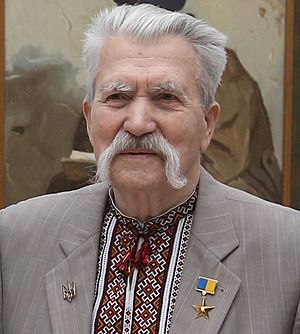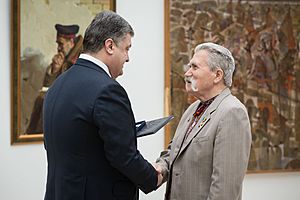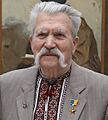Levko Lukianenko facts for kids
Quick facts for kids
Levko Lukianenko
|
|
|---|---|
| Левко Лук'яненко | |

Lukianenko in 2016
|
|
| 1st Ambassador of Ukraine to Canada | |
| In office 14 May 1992 – 15 October 1993 |
|
| Preceded by | Position established |
| Succeeded by | Victor Batiuk |
| People's Deputy of Ukraine | |
| In office 14 May 2002 – 15 June 2007 |
|
| Constituency |
|
| In office 15 May 1990 – 12 May 1998 |
|
| Constituency |
|
| Personal details | |
| Born | 24 August 1928 Khrypivka, Ukrainian SSR, Soviet Union (now Ukraine) |
| Died | 7 July 2018 (aged 89) Kyiv, Ukraine |
| Political party | URP |
| Other political affiliations |
CPSU (1953-1961) |
| Spouse | Nadiia Lukianenko (nèè Buhaievska) |
| Alma mater | Moscow State University |
| Occupation | jurist, politician, writer |
| Awards | |
Levko Hryhorovych Lukianenko (Ukrainian: Левко́ Григо́рович Лук'я́ненко; born August 24, 1928 – died July 7, 2018) was an important Ukrainian politician and writer. He was known as a Soviet dissident, meaning he bravely spoke out against the Soviet government. He was also awarded the title Hero of Ukraine for his work.
Lukianenko was one of the people who helped start the Ukrainian Helsinki Group in 1976. This group worked to protect human rights in Ukraine. Later, in 1988, he became a leader of the Ukrainian Helsinki Association. He is also famous for writing the Declaration of Independence of Ukraine, which helped Ukraine become a free country.
Contents
Early Life and His Fight for Ukraine
Levko Lukianenko was born on August 24, 1928, in a village called Khrypivka in the Soviet Union. When he was 15, during World War II in 1944, he joined the Soviet Army. He served in places like Austria. While in Austria, he saw Ukrainian grain being taken away, which reminded him of the terrible Holodomor (a famine in Ukraine in the 1930s) when he almost starved. This experience made him decide to fight for an independent Ukraine.
In 1953, Lukianenko started studying law at Moscow State University. He joined the Communist Party of the Soviet Union (CPSU) around this time. He later said he joined the party only to help Ukraine more effectively. After finishing university in 1958, he worked as a propagandist for the Communist Party. However, he soon realized he could not truly support the party's ideas.
Standing Up for Freedom: Dissident Activity
In 1959, Levko Lukianenko helped create a group called the Ukrainian Workers and Peasants Union. This group wanted Ukraine to be independent from the Soviet Union. They believed in the right for Ukraine to separate, which was even mentioned in the Soviet Constitution.
In May 1961, because of his actions, he was arrested and sentenced to death. This was for "separatism" and "undermining the credibility" of the Communist Party. After 72 days, his sentence was changed to 15 years in a prison camp. He spent time in harsh camps in Mordovia and Vladimir.
After he was released in 1976, he moved to Chernihiv. There, he became a founding member of the Ukrainian Helsinki Group. This group worked to make sure the Soviet Union followed human rights agreements. But in 1977, he was arrested again. This time, he was sentenced to 10 years in a camp and 5 years of internal exile for "Anti-Soviet agitation and propaganda."
In 1988, he was finally released during a time of change in the Soviet Union called Mikhail Gorbachev's perestroika. He had spent a total of 27 years in prison for his beliefs.
A Leader in Independent Ukraine
After his release, Lukianenko became a very important political figure. In March 1990, he was elected as a member of the Verkhovna Rada, which is Ukraine's parliament. The next month, he became the head of the new Ukrainian Republican Party.
He helped write the Declaration of State Sovereignty of Ukraine. Most importantly, he was the author of the Declaration of Independence of Ukraine, which was adopted in 1991. This document was a huge step for Ukraine to become its own country.
In 1991, he ran for president of Ukraine and came in third place. From May 1992 to November 1993, Lukianenko served as the first Ukrainian ambassador to Canada. He later resigned because he disagreed with some government policies.
He continued to be a People's Deputy of Ukraine (a member of parliament) from 1994 to 1998. In 2005, he was given the highest honor, the title of Hero of Ukraine, by President Viktor Yushchenko.
Lukianenko was elected to the Verkhovna Rada again in 2006 and 2007 as part of the Yulia Tymoshenko Bloc. He also continued to lead the Ukrainian Republican Party. In 2007, he received the Order of Prince Yaroslav the Wise. In 2016, he was awarded the Shevchenko National Prize, a very important award for culture and arts in Ukraine.
His Final Years
Levko Lukianenko passed away in a hospital in Kyiv on July 7, 2018. He was buried in Kyiv's Baikove Cemetery. Many people attended his funeral, including Ukrainian President Petro Poroshenko.
In February 2023, a street in Dnipro was renamed Levko Lukianenko street to honor him.
Personal Life
Levko Lukianenko was married to Nadiia Buhaievska. They did not have children.
See also
 In Spanish: Levkó Lukiánenko para niños
In Spanish: Levkó Lukiánenko para niños
- Soviet dissidents
Images for kids
 | John T. Biggers |
 | Thomas Blackshear |
 | Mark Bradford |
 | Beverly Buchanan |



